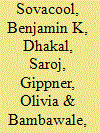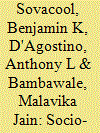|
|
|
Sort Order |
|
|
|
Items / Page
|
|
|
|
|
|
|
| Srl | Item |
| 1 |
ID:
103385


|
|
|
|
|
| Publication |
2011.
|
| Summary/Abstract |
This article explores the concept of energy security perceived and understood by a sample of government, business, civil society, and university stakeholders in India. Based on a literature review, the authors hypothesize what energy experts suggest energy security is for India. The article then tests these hypotheses through the use of a survey completed by 172 Indian respondents. The article begins by describing its methodology before summarizing the results of the literature review to distill seven working hypotheses related to energy security in India. These hypotheses relate to (1) security of energy supply, (2) equitable access to energy services, (3) research and development of new energy technologies, (4) energy efficiency and conservation, (5) self-sufficiency and trade in energy fuels, (6) nuclear power, and (7) the energy-water nexus. It then tests these hypotheses with our survey instrument before concluding with implications for energy policy in India and beyond.
|
|
|
|
|
|
|
|
|
|
|
|
|
|
|
|
| 2 |
ID:
126163


|
|
|
|
|
| Publication |
2013.
|
| Summary/Abstract |
Underinvestment, low levels of electricity access, natural disasters, topography and hydrology make Nepal's electricity crisis akin to 'peeling a pickle': difficult to pin down and hard to manage. Based primarily on the perceptions of a sample of experts, this article lays out a roadmap for how the 'pickle' of the Nepali electricity crisis can be peeled. Drawing on primary data collection from research interviews, the study offers a brief summary of the Nepali electricity and energy sectors. It then details six separate electricity challenges identified by respondents-topography and climate; political instability resulting from the aftermath of the Maoist insurgency; poverty and corruption; lack of financing and investment; constrained technological and human resources; and, finally, aid dependency and political manoeuvring. We conclude by calling on Nepali policymakers to invest in distributed generation, transmission upgrades, seasonal hydroelectric storage and industrial energy efficiency practices, and to introduce electricity tariff reforms, among other measures.
|
|
|
|
|
|
|
|
|
|
|
|
|
|
|
|
| 3 |
ID:
103450


|
|
|
|
|
| Publication |
2011.
|
| Summary/Abstract |
This study explores the socio-technical barriers to Solar Home Systems (SHS) in Papua New Guinea. The authors collected primary data through semi-structured research interviews conducted over the course of February 2010-April 2010. Respondents included government officials, financiers, planners, commercial distributors and companies, teachers and rural villagers in addition to members of civil society, academics, consultants, and trainers. These interviews were supplemented with site visits to Port Moresby, Goroka, and Madang, and field research in the villages of Akameku, Asaroka, Lufa, Kundiawa, Okifa, Simbu, and Talidig. The study draws from these interviews and visits to discuss four types of barriers. Technical barriers relate to substandard equipment and logistical problems. Economic barriers include high rates of poverty, misconceptions about the role of currency, and lack of financing. Political barriers include poor institutional capacity and a government commitment to fossil-fueled grid electrification. Social barriers encompass unrealistic expectations about what SHS can provide along with jealousy, theft, vandalism, and unfamiliarity with solar technology.
|
|
|
|
|
|
|
|
|
|
|
|
|
|
|
|
|
|
|
|
|